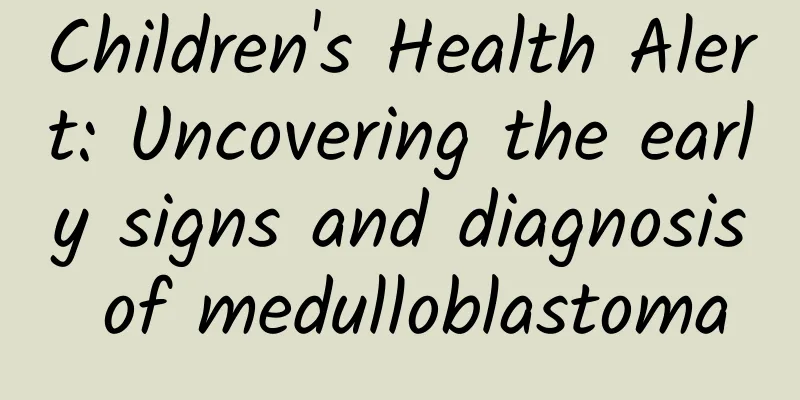Children's Health Alert: Uncovering the early signs and diagnosis of medulloblastoma

|
Medulloblastoma in children is a highly malignant tumor that often occurs in the cerebellum, posing a serious threat to children's health. Understanding the early symptoms and examination methods of the disease is of great significance for early detection and treatment. Early symptoms Headache: Medulloblastoma may cause increased intracranial pressure in the early stages, resulting in headaches. This headache is usually worse at night or in the morning and may be accompanied by dizziness and nausea. Vomiting: When intracranial pressure increases, the child may experience nausea and vomiting, and the vomiting may be projectile-like, accompanied by symptoms such as loss of appetite. Vision problems: As the disease progresses, the tumor may press on the optic nerve, causing blurred vision, decreased vision, etc. Sometimes double vision may also occur, especially when gazing outward. Unstable gait: When the cerebellar vermis is damaged, the child may experience unsteady gait and unstable standing, which may manifest as trunk or gait ataxia. Hearing loss: Medulloblastoma may cause compression of the cerebellum, affecting ear function and leading to hearing loss. Paresthesia: When the cerebellar nerves are compressed, the child may experience paresthesias, such as numbness of the limbs. In addition to the typical symptoms mentioned above, infants may also experience atypical symptoms such as decreased energy, delayed motor development, delayed physical development, and feeding difficulties. If the tumor spreads to the spinal cord, it may also cause back pain, difficulty walking, and difficulty urinating and defecating. Inspection method Neurological examination: This may reveal abnormalities of the brain, spinal cord, and nerves. Patients with midline tumors often have truncal or gait ataxia. Lumbar puncture: Increased cerebrospinal fluid pressure, biochemical protein and leukocytosis account for a certain proportion. However, patients with optic disc edema should be careful during lumbar puncture to avoid inducing brain herniation. Imaging tests Plain head X-ray: signs of increased intracranial pressure may be seen, but tumor calcification is extremely rare. CT scan: It can clearly show the equal-density or slightly higher-density masses in the cerebellar vermis or four chambers, most of which are separated from the bottom of the fourth ventricle. There is a thin low-density edema band around the tumor, which is obviously uniformly enhanced. MRI: More sensitive in showing the relationship of the tumor to the floor of the fourth ventricle and its origin from the cerebellar vermis. In summary, the early symptoms of medulloblastoma in children are diverse. Parents should pay close attention to their children's health and seek medical attention in time if any abnormality is found. Through professional examination and diagnosis, early detection and treatment can provide the best treatment opportunity for children. |
>>: Daily care for patients with hypertension: from diet to exercise
Recommend
How to choose pine nuts? Will eating pine nuts cause internal heat?
Pine nuts are also called "open pine nuts&qu...
What to do if a pregnant woman is infected with a virus
In the season when influenza is prone to occur, e...
Cervical cancer is not scary! This article will help you unlock the secrets of this "female killer"
On October 20, 2002, my country's outstanding...
Understanding of transvaginal B-ultrasound examination
Vaginal B-ultrasound examination is a kind of vag...
Can breast nodules cause back pain?
Nodules are distributed in various parts of our b...
What to do if a pregnant woman has a lump in her breast
Some pregnant mothers find lumps in their breasts...
Can I drink alcohol after taking Xiaoyao Pills?
Women's health is often affected by various f...
How to treat yellow leucorrhea
If the leucorrhea changes to a yellow tofu-like c...
Golden apple in the morning, poisonous apple in the evening? An apple a day keeps the doctor away? The truth about apples
Expert of this article: Liu Jingjing, PhD in Food...
What is the difference between vaginal B-ultrasound and conventional B-ultrasound?
B-ultrasound is a common examination method and i...
What to do if women have irregular menstruation
Irregular menstruation in women is a big problem ...
There is a sour smell down there. What's going on?
Women should pay special attention to the health ...
Causes of sagging breasts in women
Every woman pays special attention to her breasts...
When can the dragon bone flower be propagated by cuttings? How can the dragon bone be propagated by cuttings to make it survive easily?
Dragon bone flowers are quite common in life. Bec...
Which department should couples go to for pregnancy check-up
Nowadays, young people think about having a baby ...









